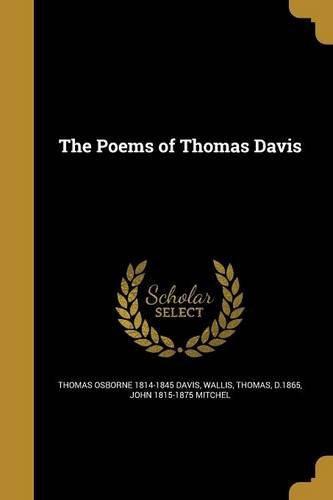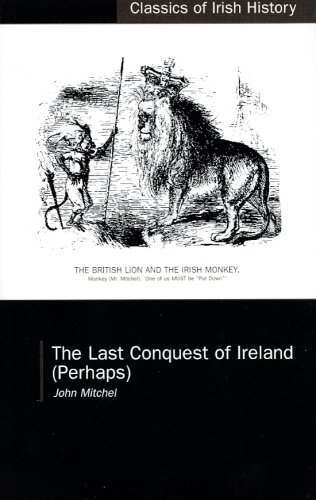Background
John Mitchel was the son of the Rev. John and Mary (Haslett) Mitchel. He was born on 3 November 1815, at Camnish, County Londonderry, Ireland.



( This work has been selected by scholars as being cultur...)
This work has been selected by scholars as being culturally important, and is part of the knowledge base of civilization as we know it. This work was reproduced from the original artifact, and remains as true to the original work as possible. Therefore, you will see the original copyright references, library stamps (as most of these works have been housed in our most important libraries around the world), and other notations in the work. This work is in the public domain in the United States of America, and possibly other nations. Within the United States, you may freely copy and distribute this work, as no entity (individual or corporate) has a copyright on the body of the work. As a reproduction of a historical artifact, this work may contain missing or blurred pages, poor pictures, errant marks, etc. Scholars believe, and we concur, that this work is important enough to be preserved, reproduced, and made generally available to the public. We appreciate your support of the preservation process, and thank you for being an important part of keeping this knowledge alive and relevant.
https://www.amazon.com/Last-Conquest-Ireland-Scholars-Choice/dp/1296453251?SubscriptionId=AKIAJRRWTH346WSPOAFQ&tag=prabook-20&linkCode=sp1&camp=2025&creative=165953&creativeASIN=1296453251

( This work has been selected by scholars as being cultur...)
This work has been selected by scholars as being culturally important, and is part of the knowledge base of civilization as we know it. This work was reproduced from the original artifact, and remains as true to the original work as possible. Therefore, you will see the original copyright references, library stamps (as most of these works have been housed in our most important libraries around the world), and other notations in the work. This work is in the public domain in the United States of America, and possibly other nations. Within the United States, you may freely copy and distribute this work, as no entity (individual or corporate) has a copyright on the body of the work. As a reproduction of a historical artifact, this work may contain missing or blurred pages, poor pictures, errant marks, etc. Scholars believe, and we concur, that this work is important enough to be preserved, reproduced, and made generally available to the public. We appreciate your support of the preservation process, and thank you for being an important part of keeping this knowledge alive and relevant.
https://www.amazon.com/Poems-Thomas-Davis-Osborne-1814-1845/dp/1372522212?SubscriptionId=AKIAJRRWTH346WSPOAFQ&tag=prabook-20&linkCode=sp1&camp=2025&creative=165953&creativeASIN=1372522212

( This work has been selected by scholars as being cultur...)
This work has been selected by scholars as being culturally important, and is part of the knowledge base of civilization as we know it. This work was reproduced from the original artifact, and remains as true to the original work as possible. Therefore, you will see the original copyright references, library stamps (as most of these works have been housed in our most important libraries around the world), and other notations in the work. This work is in the public domain in the United States of America, and possibly other nations. Within the United States, you may freely copy and distribute this work, as no entity (individual or corporate) has a copyright on the body of the work. As a reproduction of a historical artifact, this work may contain missing or blurred pages, poor pictures, errant marks, etc. Scholars believe, and we concur, that this work is important enough to be preserved, reproduced, and made generally available to the public. We appreciate your support of the preservation process, and thank you for being an important part of keeping this knowledge alive and relevant.
https://www.amazon.com/Jail-Journal-John-Mitchel/dp/1376256401?SubscriptionId=AKIAJRRWTH346WSPOAFQ&tag=prabook-20&linkCode=sp1&camp=2025&creative=165953&creativeASIN=1376256401

(Excerpt from The Life and Times of Aodh O'neill, Prince o...)
Excerpt from The Life and Times of Aodh O'neill, Prince of Ulster: Called by the English, Hugh, Earl of Tyrone, With Some Account of His Predecessors, Con, Shane and Tirlough The writer of these pages boasts to be of that blood himself: no Milesian drop flows in his veins; and therefore he may be the more easily believed in disclaiming the base intention to ex asperate Celtic Irish against Saxon Irish, or to revive ancient feuds between the several races that now occupy Irish soil, and are known to all the.world besides, as Irishmen. About the Publisher Forgotten Books publishes hundreds of thousands of rare and classic books. Find more at www.forgottenbooks.com This book is a reproduction of an important historical work. Forgotten Books uses state-of-the-art technology to digitally reconstruct the work, preserving the original format whilst repairing imperfections present in the aged copy. In rare cases, an imperfection in the original, such as a blemish or missing page, may be replicated in our edition. We do, however, repair the vast majority of imperfections successfully; any imperfections that remain are intentionally left to preserve the state of such historical works.
https://www.amazon.com/Life-Times-Oneill-Prince-Ulster/dp/1528173694?SubscriptionId=AKIAJRRWTH346WSPOAFQ&tag=prabook-20&linkCode=sp1&camp=2025&creative=165953&creativeASIN=1528173694

(John Mitchel's account of the Repeal campaign, the Famine...)
John Mitchel's account of the Repeal campaign, the Famine and the 1848 Rising in Ireland, which originally appeared in Mitchel's Tennessee-based newspaper, The Southern Citizen.
https://www.amazon.com/Conquest-Ireland-Perhaps-Classics-History/dp/1904558364?SubscriptionId=AKIAJRRWTH346WSPOAFQ&tag=prabook-20&linkCode=sp1&camp=2025&creative=165953&creativeASIN=1904558364
John Mitchel was the son of the Rev. John and Mary (Haslett) Mitchel. He was born on 3 November 1815, at Camnish, County Londonderry, Ireland.
Mitchel received his early education at Dr. Henderson's Classical School in Newry where he met his lifelong friend John Martin. After completing his schooling in Newry he attended Trinity College, Dublin from whence he graduated with a law degree in 1834.
In 1840, Mitchel began to practice law in Newry. He did not become active in politics until 1845 when he joined the Young Ireland movement, a protest against O'Connell's policy of non-resistance. In the same year, he became a member of the staff of the Nation, but in time he became dissatisfied, and when, in January 1847, the Irish Confederation was formed he founded the United Irishmen to advocate armed resistance to England and the repeal of the Union. He was arrested and in May 1848 a packed jury found him guilty of treason-felony and he was sentenced to fourteen years transportation. His remarkable speech from the dock was the culminating point in his career. After he had spent some months in Bermuda his failing health caused his transfer to Van Diemen's Land, from which he and his family, who had joined him in 1851, escaped in 1853. He was enthusiastically welcomed in San Francisco on October 9, 1853, receiving a similar reception in New York on November 29. Within two weeks he had conceived the plan of a newspaper. This was the Citizen, dedicated to the cause of Irish freedom, which began publication in New York on January 7, 1854. The paper quickly attained a circulation of 50, 000, but Mitchel's bluntness soon arrested its growth. In his controversy with Henry Ward Beecher, he launched a bitter fight against the abolitionists and imprudently announced himself in favor of slavery. By writing against the temporal power of the pope he alienated a large group of Catholic readers and at the same time, he antagonized the members of the Know-Nothing party. In the face of these disputes, his enthusiasm for America sensibly diminished. In 1854, he twice visited Virginia. His cordial receptions there determined him to settle in the South, and at the end of the year he gave up the Citizen and in the following spring settled on a farm at Tuckaleechee Cove, thirty-two miles from Knoxville, Tenn. He busied himself with farming and with extensive lecture tours. In the fall of 1856, he moved to Knoxville, where one year later he began to publish the Southern Citizen, an extremist paper devoted to the slavery interests. It survived almost two years; the second year it was published in Washington. In the midst of these labors, Mitchel was still interested in Irish freedom, and when, in 1859, it appeared that France might declare war on Great Britain, he hastened to Paris.
This was an idle quest, but in July 1860, he moved his family to Paris and became the French correspondent for several papers, among them the Charleston Standard. Late in 1862, he returned to New York, succeeded in reaching Virginia, and there his three sons joined the Confederate army while he edited the Richmond Enquirer and served on the ambulance committee of the Confederate army. In the spring of 1864, he broke his connections with Jefferson Davis and became editor of the Examiner. Early in 1865, he went to New York as editor of the Daily News, a Democratic paper actively opposed to the Grant administration. For his violent writings, he was imprisoned more than four months in Fortress Monroe; from this imprisonment, he never recovered his mental or physical powers. He spent the winter of 1865-66 in Paris as a Fenian agent, returning to Richmond to engage in literary work. He again returned to New York as editor of the Irish Citizen, published from October 19, 1867, to July 27, 1872. Here he fought Grant and criticized the Fenian movement, which diminished the paper's circulation. During the winter of 1872-73, he wrote a series of articles attacking J. A. Froude's views on the Irish. He returned to Ireland for the last time in 1875. There, as a last gesture of defiance to the British government, he accepted election to Parliament, shortly after which he died.
John Mitchel was a leading member of both Young Ireland and the Irish Confederation. His Jail Journal is one of Irish nationalism's most famous texts. A significant number of Gaelic Athletic Association clubs are named in his honour, including Newry Mitchel's GFC in his home town, John Mitchel's Claudy, Castlebar Mitchels GAA, John Mitchel's Glenullin, John Mitchel's Liverpool and others both north and south of the border, as well as several in England and Australia. A statue to Mitchel was also erected by the people of Newry, and is located at John Mitchel Place, an extension of Newry's main street, Hill Street. Mitchel Park is named after him in Dungiven, Northern Ireland, as is Mitchell County, Iowa, in the United States. Fort Mitchel on Spike Island is named in his honour.
(Excerpt from The Life and Times of Aodh O'neill, Prince o...)
(John Mitchel's account of the Repeal campaign, the Famine...)
( This work has been selected by scholars as being cultur...)
( This work has been selected by scholars as being cultur...)
( This work has been selected by scholars as being cultur...)
Mitchel assumed a prominent role in the Confederation, openly advocating the complete separation from England, a belief he fervently advocated for the rest of his life. He firmly believed that England would never grant Ireland any degree of freedom willingly and concluded that physical force was the only option if freedom was to be achieved.
During the period of his exile from Ireland, Mitchel confessed that he was "truly dead and a ghost"; following his conviction in 1848, he did not actively participate, with one small exception, in any important Irish movement. He had much love of Ireland, but a far greater hatred of England, and his desire for vengeance against England motivated him throughout his life. His intense nationalism prevented his feeling any spirit of kinship with other men working in similar causes; for liberty in the abstract and humanity at large he cared nothing; Socialists he termed "worse than wild beasts, " and for Communists, "unhappy creatures, " he recommended "grape and cannister. " He was neither poet nor dreamer, merely a hard-headed patriot who sought to combat British force with Irish violence. His present influence in Ireland is explained by the eloquence of his writings, especially his Jail Journal (1854) and The Crusade of the Period: and Last Conquest of Ireland (Perhaps) (1873).
On February 3, 1837, Mitchel married Jane (Jenny) Verner of Newry, by whom he had three sons and two daughters.
